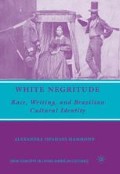Abstract
In Casa-Grande e Senzala, Gilberto Freyre casts the intimate contact between masters and slaves as the origin for Brazilian “hybridity.” Because he emphasizes the cultural and atmospheric transmission of identity, his analysis has been widely perceived as a progressive departure from eugenic interpretations of national character.
Access this chapter
Tax calculation will be finalised at checkout
Purchases are for personal use only
Preview
Unable to display preview. Download preview PDF.
Copyright information
© 2008 Alexandra Isfahani-Hammond
About this chapter
Cite this chapter
Isfahani-Hammond, A. (2008). From the Plantation Manor to the Sociologist’s Study: Democracy, Lusotropicalism, and the Scene of Writing. In: White Negritude. New Concepts in Latino American Cultures. Palgrave Macmillan, New York. https://doi.org/10.1057/9780230610118_5
Download citation
DOI: https://doi.org/10.1057/9780230610118_5
Publisher Name: Palgrave Macmillan, New York
Print ISBN: 978-1-349-53658-0
Online ISBN: 978-0-230-61011-8
eBook Packages: Palgrave Literature & Performing Arts CollectionLiterature, Cultural and Media Studies (R0)

